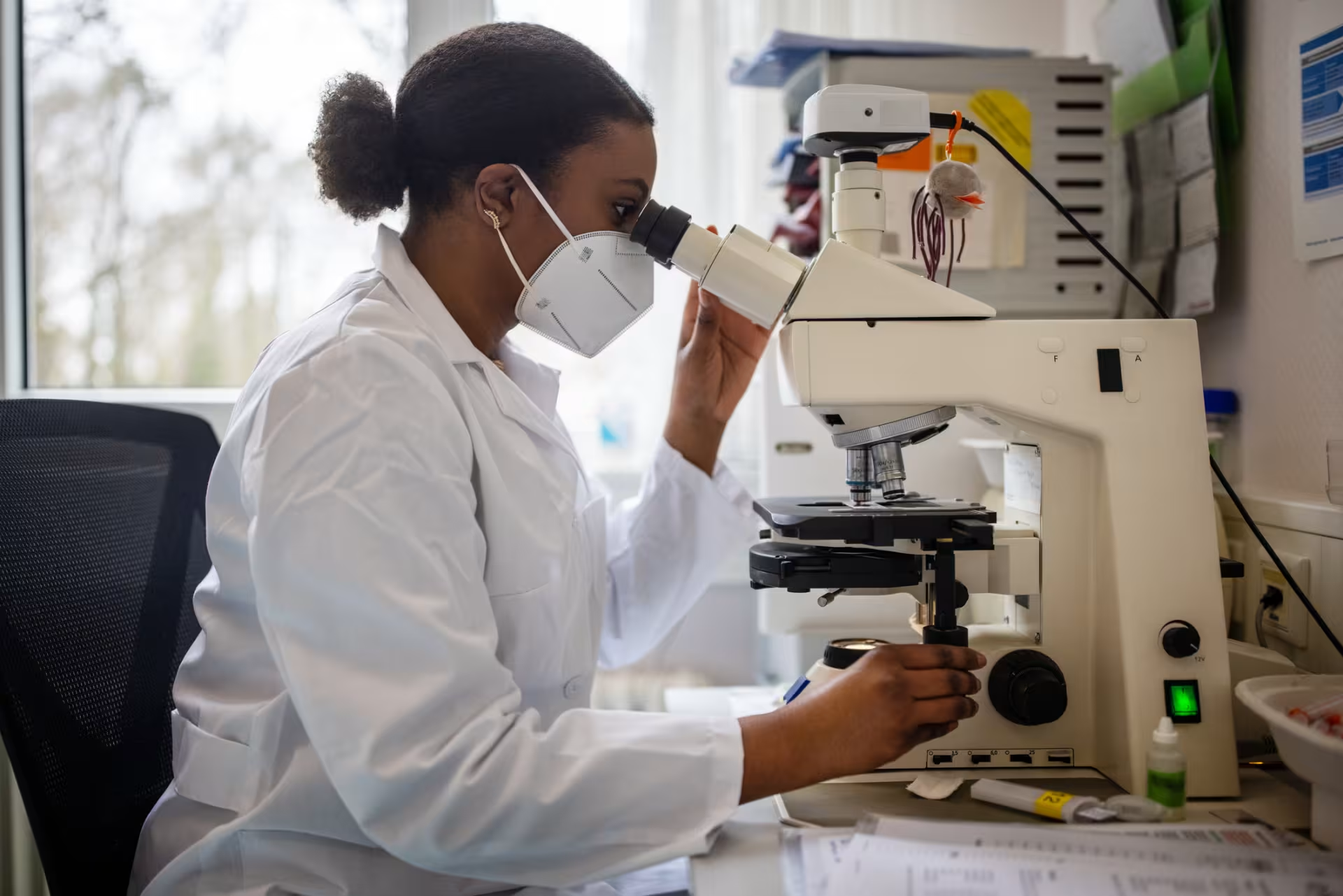
How To Become a Pathologist
What Is a Pathologist?
A pathologist is a medical doctor who specializes in investigating the causes and effects of both diseases and injuries. Their work supports the work of other doctors in making diagnoses and developing treatment plans for patients, which is why pathologists are sometimes referred to as “doctors’ doctors.”(See disclaimer 1)
Within this field of medicine, there are a few main areas of specialization, as well as multiple subspecialties. Anatomical pathologists focus on the analysis of tissues and organs. Clinical pathologists specialize in the testing of body fluids and cells extracted from tissue samples. Professionals who conduct both categories of tests are general pathologists. Some subspecialties within these categories include forensic, chemical and pediatric pathology.(See disclaimer 1) No matter which specialization you’re interested in, the career pathway is similar.
Annual revenue for the pathology industry as of 2024(See disclaimer 2)
What Does a Pathologist Do?
An accurate diagnosis, the basis for an effective treatment plan, is made possible by the expertise of pathologists. What does a pathologist do to help patients achieve the right diagnosis? They conduct a variety of tests using sophisticated medical laboratory equipment. These tests help to uncover the causes and effects of diseases and injuries. Their findings can support the care of living patients or uncover potential causes of death.
While the specific duties of a pathologist can vary depending on their specialization, these medical doctors may do any of the following:(See disclaimer 1,3)
Visual Exam
Pathologists typically begin by visually examining fluids and tissue samples, both with the naked eye and with a microscope.
Laboratory Analysis
Pathologists conduct a range of tests, including those involving immunohistochemistry, histopathology, tissue cytogenetics and flow immunophenotyping.
Medical Reports
Pathologists compile their findings into reports of the test results, which are sent to the patient’s treating physician.
Medical Research
Some pathologists may conduct research on lab analysis technology and techniques.
Supervision
A pathologist may supervise other laboratory staff.
What Experience and Education Does a Pathologist Need?
If you have a passion for both science and healthcare, you might consider becoming a pathologist. While some pathologists might deviate slightly from the standard career pathway, there are some requirements they all must meet.
Pathologists and other types of medical doctors have a lengthy career preparation pathway with many requirements to meet. However, if you’re dedicated to pursuing a medical career and genuinely want to help patients, then you may find this career path worth the effort. Pathologists can support the care of patients with cancer, chromosome disorders and a wide range of other medical conditions.(See disclaimer 1)
Here’s a look at how to become a pathologist:
High School Diploma
College and Medical Degrees
Entry Level Roles
Professional Certifications
Best Degrees for Pathologists
All pathologists need to attend medical school, pass the licensure exams and obtain a medical license, just like other types of physicians. While it’s possible to pursue entry into medical school with a variety of different degrees, the most relevant degree is a pre-med emphasis that will allow you to meet the admission requirements for your chosen medical schools.(See disclaimer 4)
In a pre-med emphasis or related degree program, you will generally have a blend of instructional coursework and laboratory classes. Your degree program will take an in-depth look at the sciences, such as biology, chemistry and physics. If you decide to earn a bachelor’s degree that doesn’t meet medical school admission requirements, then you might consider adding additional coursework or a minor area of study.
A typical pre-med emphasis program will cover topics such as:
Human anatomy
Biochemistry
Cellular biology
Microbiology
Medical terms
GCU Recommends These Degree Programs for Pathologists
Remember that the most relevant bachelor’s degree program for an aspiring pathologist is a pre-med emphasis. However, there may also be some other choices available to you. You should research the entrance requirements for the medical schools you may want to attend prior to enrolling in a degree program.
What Skills Does a Pathologist Need?
Pathologists need strong competencies in medical science and laboratory testing, along with a variety of soft skills.
To be effective in their role as diagnostic experts, a pathologist can benefit from a diverse skill set that includes the following:(See disclaimer 1,3,4)
Medical diagnostics
Use of laboratory equipment
Chemistry
Attention to detail
Communication skills
Problem-solving
Manual dexterity
Organizational skills

Where Do Pathologists Work?
A pathologist is a unique type of medical doctor in that they do not typically interact much with patients. However, their work is vital in helping patients discover the reasons for their symptoms. Thanks to pathologists’ laboratory analyses, treating physicians can develop patient-focused treatment plans.
Pathologists typically work in laboratory settings, including the following:(See disclaimer 5)
Community Hospitals and Clinics
Pathologists may staff the medical laboratory at local hospitals and clinics.
University Hospitals and Clinics
Some pathologists work at research laboratories.
Government Hospitals and Clinics
Pathologists can also work at government hospitals, such as those operated by Veterans Affairs (VA).
Independent Laboratories
Independent labs may test samples sent for analysis from a range of healthcare providers.
Median annual salary for pathologists as of May 2023(See disclaimer 6)
Estimated job growth rate for pathologists from 2023 to 2033(See disclaimer 7)
Advancement Opportunities Within Pathology
Since the role of the pathologist is not an entry-level one, many pathologists may decide to stay in this role for the entirety of their careers. Others may decide to pursue career advancement. After gaining some experience, a pathologist may pursue a career as the director of a pathology lab or in hospital administration. Some pathologists may alternatively pursue leadership positions in research organizations or medical schools, while others might start their own independent pathology laboratory.(See disclaimer 5)

Explore More on Pathology
Stay informed with the latest insights and updates on pathology and other medical careers.

If you love STEM subjects, there is a world of possibilities available to you. Consider careers in healthcare, environmental science and beyond.

Conducting research studies is an important part of a future scientist’s well-rounded education.

Biology degrees are ideal for a range of career paths, and some offer specializations in pre-med, pre-pharmacy and other areas.

Pursue your passion for medical science and patient care. Request information about earning your pre-med emphasis at GCU today.
- Santiago, A.C. (2024, Feb. 27). What Does a Pathologist Do? Verywell Health. Retrieved Oct. 31, 2024.
- Buchko, M. (2024, March). Pathologists in the U.S. – Market Research Report (2014-2029). IBIS World. Retrieved Oct. 31, 2024.
- Stevens, A., PhD. (2024, Aug. 18). How To Become a Pathologist in 8 Steps (with salary). Indeed. Retrieved Oct. 31, 2024.
- U.S. Bureau of Labor Statistics. (2024, Aug. 29). How To Become a Physician or Surgeon. Occupational Outlook Handbook. Retrieved Oct. 31, 2024.
- Cleveland Clinic. (2023, Jan. 17). Pathologist. Cleveland Clinic. Retrieved Oct. 31, 2024.
- The earnings referenced were reported by the U.S. Bureau of Labor Statistics (BLS), Physicians and Surgeons, as of May 2023, retrieved Nov. 19, 2024. Due to COVID-19, data from 2020 to 2023 may be atypical compared to prior years. BLS calculates the median using salaries of workers nationwide with varying levels of education and experience. It does not reflect the earnings of GCU graduates as Pathologists, nor does it reflect the earnings of workers in one city or region of the country or a typical entry level salary. Median income is the statistical midpoint for the range of salaries in a specific occupation, and less than half the workers in an occupation. It may give you a basis to estimate what you might earn at some point if you enter this career. Grand Canyon University can make no guarantees on individual graduates’ salaries. Your employability will be determined by numerous factors over which GCU has no control, such as the employer the graduate chooses to apply to, the graduate’s experience level, individual characteristics, skills, etc. against a pool of candidates.
- COVID-19 has adversely affected the global economy and data from 2020 to 2023 may be atypical compared to prior years. Accordingly, data shown is effective September 2024, which can be found here: U.S. Bureau of Labor Statistics, Occupational Outlook Handbook, Physicians and Surgeons, retrieved Nov. 19, 2024.

